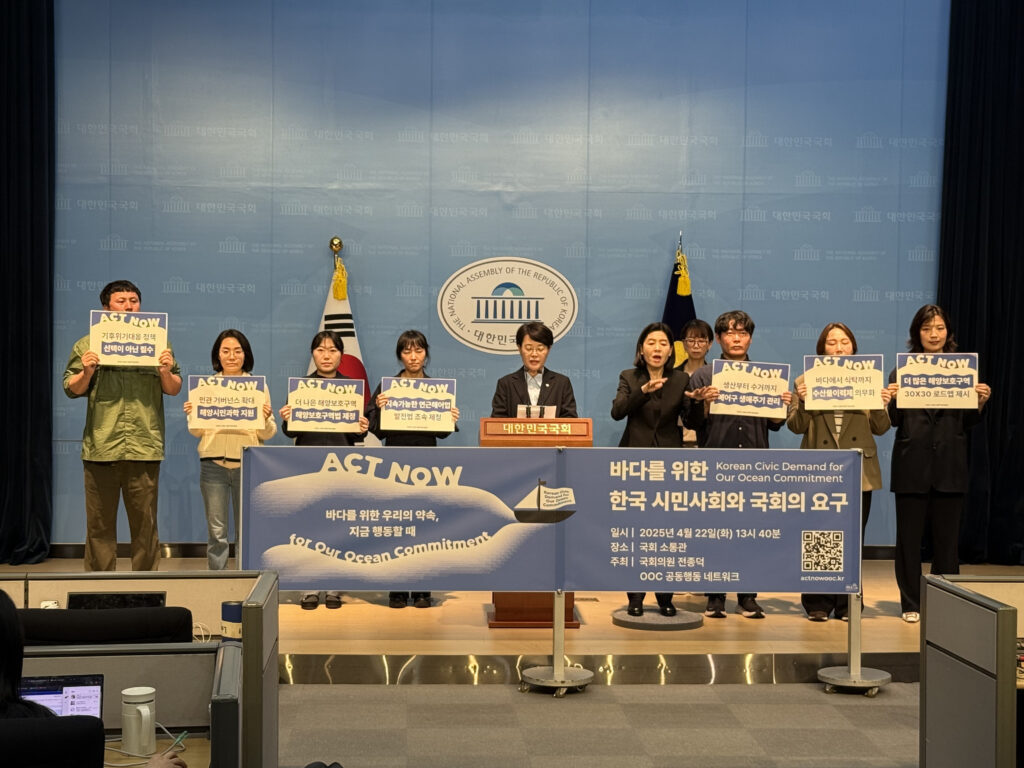- Joint Action by National Assembly and Civil Society… Calling on the Korean Government for Commitments to the Ocean Ahead of OOC
- Four Themes, 15 Key Demands for a Sustainable Ocean
On April 22, National Assembly member Jeon Jong-deok (Progressive Party) and the Our Ocean Conference (OOC) Joint Action Network held a press conference at the National Assembly’s press center to announce the “Demands of Korean Civil Society and National Assembly for the Ocean.” The participants urged the Korean government to implement responsible marine conservation policies and called for active engagement at the upcoming 10th Our Ocean Conference (OOC).
The 10th OOC will take place from April 28 to 30 at BEXCO in Busan. The conference will focus on seven core agenda items, including preventing marine pollution, expanding marine protected areas (MPAs), addressing climate change, and promoting sustainable fisheries. Governments, international organizations, and global NGOs will gather to discuss marine policy and explore collaborative solutions. As the host nation, Korea bears the responsibility of contributing to the international community and marine environment through progressive policy declarations.
Rep. Jeon stated, “The OOC in Busan will serve as a significant opportunity for Korea to declare and implement its commitment to marine ecosystem conservation on the global stage.” He also pledged to “foster collaboration with relevant ministries such as the Ministry of Oceans and Fisheries, together with civil society, and actively pursue related legislative efforts.”
 ⓒ OOC Joint Action Network
ⓒ OOC Joint Action Network
Korea agreed at the 15th Conference of the Parties to the Convention on Biological Diversity (COP15) in 2022 to designate 30% of its marine area as protected by 2030. However, as of early April 2025, marine protected areas in Korea account for only 1.84%, and although the area has recently increased with the designation of the waters near Gwantaldo, Jeju, as a marine protected area, there is still a long way to go to achieve the 30% target. Also, due to unclear management responsibilities and insufficient protection measures, these areas are often criticized as “paper parks.” Sun-hwa Park, a team leader at the Climate Ocean Research Institute, remarked, “Korea’s marine protected areas fall short in both scale and management compared to its international commitments.” She added, “The government must not only expand MPAs through designating large areas but also ensure effective protection by restricting fishing and implementing ongoing monitoring efforts. Additionally, Korean government must contribute to expanding high seas protected areas by ratifying the BBNJ agreement.”
Marine litter is another major threat to marine ecosystems worldwide. The 5th Intergovernmental Negotiating Committee (INC-5) for a UN plastic pollution treaty, held last year in Busan, failed to reach a final agreement. The Korean government has also been criticized for not taking a strong stance on reducing plastic production. Sol Kim, an activist with the Korea Federation for Environmental Movements, emphasized, “Each year, 145,000 tons of trash are dumped into the sea from Korea—about 400 tons a day.” She highlighted the deteriorating ocean environment and stated, “Fishing gear waste such as nets, buoys, and ropes discarded during fishing operations needs urgent management. Practical gear management policies must be established, and as the host of OOC, the Korean government must take the lead in declaring proactive ocean policies.”
Overfishing is also leading to a drastic decline in marine biodiversity. As small-scale fisheries are replaced by industrial operations, the overharvesting of juvenile fish and illegal fishing are becoming rampant. Campaigner Woo-rim Ha from the Environmental Justice Foundation said, “Half of Korea’s coastal catch consists of juvenile fish. Excessive harvesting before they can mature has led to a continual decline in overall fish stocks.” She added, “Lack of transparency in seafood distribution fosters illegal fishing and accelerates the depletion of marine resources. The government must ensure full traceability from sea to table and guarantee safe, sustainable, and ethical seafood.”
Rising sea temperatures due to the climate crisis are also severely impacting marine ecosystems, yet even basic monitoring is lacking. Eun-joo Kang, director at Eco Horizon Institute, explained, “Korea’s marine ecosystems are rapidly changing due to climate change. Coral reefs in Jeju are bleaching, and surface sea temperatures are breaking records year after year.” She stressed the need for expanded monitoring and citizen science initiatives, decarbonization of international shipping, and policies for offshore wind development that coexist with nature. Kang warned of the dangers of unchecked marine development and wind energy expansion that ignore ecological considerations and called for policies that balance renewable energy with ecosystem protection.
Meanwhile, civil society and the National Assembly plan to closely monitor whether the Korean government makes and fulfills policy commitments during the OOC. They intend to continue follow-up activities after the conference.
[Press Statement]
Demands of Korean Civil Society and the National Assembly for the Ocean
OOC Joint Action Network
